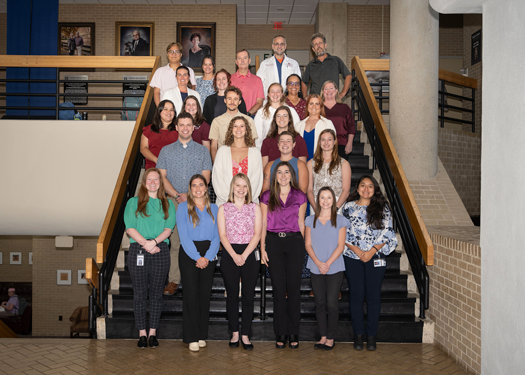The Program
To achieve the program goals, students receive training through two major components. The first is a hands-on research experience with a faculty mentor that continues throughout the 12-week program. The second component is a series of interactive educational experiences that are integrated throughout the program and culminate in attending the Veterinary Scholars Symposium.
Research Component
For the research component, each student in the Summer Research Experience works with a faculty mentor who has a matching research interest on a relevant medical or veterinary problem. Through interaction with the mentor, trainees receive training in the formulation of a testable hypothesis and in the design of an appropriate experimental strategy. Trainees conduct research in the faculty mentor’s lab, and they work under their mentor and other laboratory personnel to gather data, analyze, and interpret their findings. Trainees then prepare and present their research results at the MSU CVM Research Day and the BI-NIH National Veterinary Scholars Symposium. Through this process, trainees learn the value of creative and critical thinking in research, and they receive practical experience in conducting, analyzing, and presenting their research findings.
Click below for summaries of research projects conducted through the program the last five summers:
2018 2019 2020 2021 2022 2023 2024
Educational Component
Much of the educational component occurs early in the program. Training is generally in the form of interactive workshops that prepare students for their research experience and provide them with leadership skills and career guidance. Training sessions include:
- Ethics in Science and Research
- Humane Use of Animals in Research
- Scientific Writing and Presentations
- Writing and Rewriting Grant Proposals
- Effectively using Library Resources to Support Research
- Patenting and Technology Transfer
- Career lunchtime talks featuring veterinarians representing different research career paths
- Veterinarians in leadership roles, representing academia, industry and government career paths
- Laboratory Safety and Biosafety
- Preparing a CV and Cover Letter
The educational component also includes visits to laboratory animal and veterinary diagnostic facilities and allows for periodic meetings between program directors, trainees, and mentors during the summer. It concludes in the BI-NIH National Veterinary Scholars Symposium, which is held annually at a US college of veterinary medicine. At the symposium, trainees present their research findings, attend sessions presented by national leaders in research and the veterinary profession, and interact with fellow veterinary student trainees from across the United States.
2024 Research Scholars

